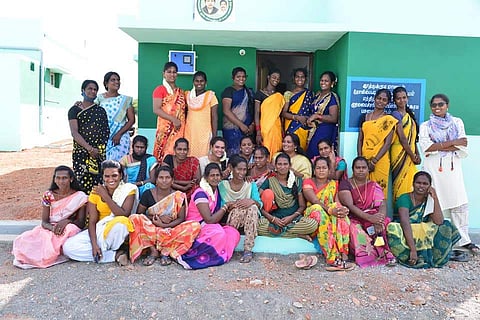

‘Namma ooru pidichirukka?’ (Do you like my village?) Grace Banu asks me.
She has a wide smile on her face as she passes on a set of keys to her younger brother, “We sell the best quality milk in all of Thoothukudi, we also have an award to prove it.” And yet, having her brother at the milk shop for a few hours helps with sales, she adds.
Grace and 29 other transgender women live and work at the Manthithope Transgenders' Milk Producers' Cooperative Society in Sandeep Nagar (named after District Collector Sandeep Naduri, who initiated the project) near Kovilpatti, a town near Thoothukudi. It is India’s first livelihood-cum-residential centre for trans people. The Aavin Milk Parlour was inaugurated a month ago.
Nestled in the lap of the Kovilpatti hills, the village is Grace’s hometown. Making this co-op happen and making a ‘respectable’ living and having a house to her name has made walking down the streets a different experience for her now. The activist says that today, not only does she walk with her head held high, even neighbouring villagers come to her for help. Government officials no more slam their doors when she seeks them out - today, she gets a seat at the table. And that's a pretty big deal.
In most cases, who decide to transition, and are disowned by their families, move to metropolitan cities with more visible trans communities in the pursuit of accessible healthcare. Often the young sever ties with both their families and hometowns - most of them never look back. But it's not as if they love the idea of uprooting themselves and shredding any vestige of the idea of a home. Or a hometown.
A place that they can call home
And that is why initiatives like the Society are vital. Geographically speaking, the opportunity to occupy spaces close or similar to their hometowns has allowed these trans women to choose the life that they prefer with the potential to reconcile with their families. Instead of merely moving away, trans people from small towns and rural regions are today renegotiating and reclaiming spaces in these regions.
Like a lot of others, Regina never liked the city, she says, “Everybody there is so cold and distant. I grew up in this environment. This is my home. I don’t wish to live anywhere else.” After Regina’s transition, her family no longer wanted her. But when we knocked on her door at the Society, it was her mother, Kangai Mariamma, who opens it. “My mother stopped going to all our family events after I transitioned. Today, our relatives come to this very house and invite us for all the festivities,” Regina says, as her mother smiles broadly. “Having resources helps with reconciliation,” Grace says as a manner of explanation.
For Yamini, returning to the village has given her the opportunity to take up farming like she had once aspired. Renuka and Swetha, join in the conversation after attending their civil service coaching classes, as Kangai, serves lunch. They all chatter about their surprise test at class. As the clock strikes three, they get up and a white Pomeranian, quite accurately named Rover, leads them to the cow sheds. Grace hoses down the cows with water to cool them off while the others begin he milking. From the profit they make, the community pays off their loans (borrowed to set up the centre) every month.
Of comfort in cows and deeper meanings
Swetha, who is HIV-positive is glad to be in familiar surroundings and in a supportive community. She occasionally visits her family who live close by and their meetings are cordial. But moving back here was not easy for Renuka, memories of discrimination and harassment haunted her, “I had to take the police along to even attend my father’s funeral.” Now she’s slowly adjusting, she says while petting a new-born calf, “It’s funny, but every cow here reflects the personality of the person who takes care of it. That one is playful but quiet, like me.” During the harvest festival of Pongal, the cows’ horns are painted in bright colours, she adds, “Now we play like little girls, reliving a childhood that was robbed from us.”
Even she was never a huge fan of the big city lights. “The city is monotonous. Here we bathe in the pond, take picnics on the hills, play hide and seek in the woods and even grow our own vegetables. Nobody can forbid us, harass us over the rent or suddenly kick us out,” Swetha says, while displaying their produce from the garden.
Buoyed by the project’s success, the Thoothukudi Collector has now set up a bee farm in Tharuvaikulam to provide employment to trans women in the vicinity. The impact has been so tangible that even officials who had been recently transferred from Thoothukudi are also contemplating similar projects. One government official who is now working in the district of Tiruvannamalai asked Grace for recommendations, “The region is famous for laddoos, so I suggested they train trans women to make them," she explains.
Clearly, a good idea can go a long way as long as it's in the right hands. As we make our way back to the office, Grace points to the CCTV footage of the farm on the computer - the shelves hold cow medicines, books and awards and above it hangs Dr BR Ambedkar’s portrait. On the milk quality testing machine is a sticker that screams Rosie the Riveter’s ‘We can do it!’.
Grace wears a knowing smile.
She and her friends had certainly done it.
This story was produced by Edex Live. It was written as part of a media skills development programme run by the Thomson Reuters Foundation supported by the Swedish Postcode Foundation. The content is the sole responsibility of the author and the publisher
